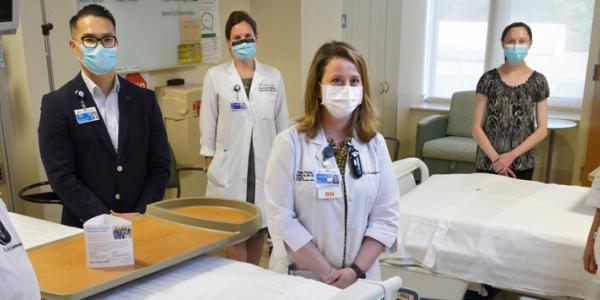
Taking immediate action to address health emergencies is just as important now as in times before the COVID-19 pandemic, especially if you are experiencing symptoms of a stroke. Unfortunately, during the height of the pandemic, many community members delayed care, but hospital emergency rooms are safe environments with continuous steps being taken to protect all patients for any needs or symptoms, including for strokes.
“Minutes truly count,” said Sherril Hopper, neurovascular nurse practitioner, Peter C. Fung, MD Stroke Center at El Camino Health. “Quick medical attention is key to reap the most benefit from available stroke treatments.”
Stroke symptoms vary depending on the area of the brain affected. Those symptoms can include a sudden onset of facial droop, change in gait, arm or leg weakness, numbness in limbs, slurred or confused speech, sudden headache, dizziness, blurred vision or an altered mental state.
“For example, administering a drug called tPA that breaks up a blood clot that may be causing a stroke can be lifesaving, but it must be given within a four-and-a-half hour window from the onset of symptoms,” according to Sherril. In addition, El Camino Health offers a minimally invasive procedure for patients with the most severe strokes.
Most stroke patients treated in the emergency room are admitted to the hospital, as it is crucial to identify the cause of the stroke and prevent it from happening again. Interventions can include drug therapy, medical or surgical interventions, as well as helping patients to identify important diet and lifestyle modifications.
“If a patient has one stroke, there is a very high risk they will have another.” said Spring Xu, RN, MSN, stroke program coordinator. “Getting the proper treatment and establishing a long-term prevention plan is critical to preventing another stroke from occurring and statistics show that if you don’t have a second stroke within five years of the first, your risk for having another stroke goes down significantly.”
Strokes and stroke symptoms have also been related to the COVID-19 symptoms. Some hospitals around the nation have seen the uncommon incidence of patients under the age of 50 who test positive for COVID-19 having strokes. Experts believe the correlation is due to the virus sometimes causing blood clots that can travel to various locations in the body, including the brain, causing stroke. Additionally, the virus can cause an altered state of mind as a result of the infection, which can present in a fashion similar to a stroke symptom.
“We screen COVID-19 patients very carefully and monitor them for any signs of stroke,” said Sherril.
Both El Camino Health hospitals in Los Gatos and Mountain View are designated by The Joint Commission as a Certified Stroke Center. The Mountain View hospital is further designated for brain intervention for stroke. Residents of Santa Clara County who call 911 for stroke symptoms are always taken to a Certified Stroke Center.
The Peter C. Fung, MD Stroke Center is staffed by a core team of stroke experts who all have extensive backgrounds in the assessment, care and treatment of patients suffering from a stroke. Along with the emergency room nurses and doctors, neurologists, interventional neurologists and neurosurgeons, the team works together to help patients achieve the best chance of recovery.